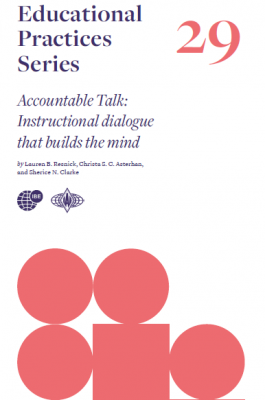Abstract:
A small but powerful body of evidence shows that certain forms of classroom discussion can produce learning gains that go beyond the topics actually discussed. In a range of countries, students who engaged in dialogue showed better initial learning and retained their learning gains for longer periods when compared to untreated comparison groups. In some cases, students who were engaged in learning through dialogue even outperformed their untreated counterparts. In this chapter, we review the evidence and consider why dialogue might produce these effects, looking at both cognitive and motivational-social explanations. Despite evidence of the surprising and robust effects on student learning, it is rare to find dialogic teaching in the classroom. We propose explanations for the resistance to it, from individual teachers and from the system, and suggest that opening up opportunities for more students to learn through dialogue will require researchers and practitioners to work together in new ways.
Publisher's Version




